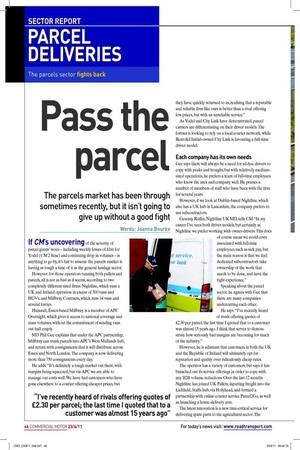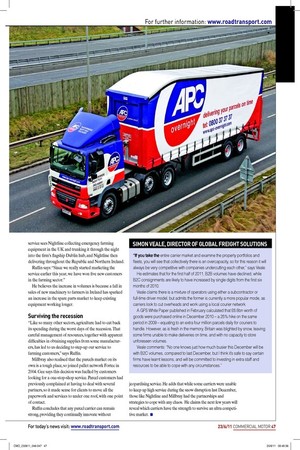Pass the parcel
Page 40

Page 41

If you've noticed an error in this article please click here to report it so we can fix it.
The parcels market has been through sometimes recently, but it isn’t going to give up without a good fight
Words: Joanna Bourke If CM’s uncovering of the severity of parcel giants’ woes – including weekly losses of £1m for Yodel (CM 2 June) and continuing drop in volumes – is anything to go by, it’s fair to assume the parcels market is having as tough a time of it as the general haulage sector.
However, for those operators running both pallets and parcels, all is not as bad as it seems, according to two completely different sized irms: Nightline, which runs a UK and Ireland operation in excess of 300 vans and HGVs; and Millbray Contracts, which runs 14 vans and several lorries.
Hainault, Essex-based Millbray is a member of APC Overnight, which gives it access to national coverage and mass volumes, without the commitment of sending vans out half empty.
MD Phil Gee explains that under the APC partnership, Millbray can trunk parcels into APC’s West Midlands hub, and return with consignments that it will distribute across Essex and North London. The company is now delivering more than 750 consignments every day.
He adds: “It’s deinitely a tough market out there, with margins being squeezed, but via APC we are able to manage our costs well. We have had customers who have gone elsewhere to a courier offering cheaper prices, but they have quickly returned to us, realising that a reputable and reliable irm like ours is better than a rival offering low prices, but with an unreliable service.” As Yodel and City Link have demonstrated, parcel carriers are differentiating on their driver models. The former is looking to rely on a local courier network, while Rentokil Initial-owned City Link is favouring a full-time driver model.
Each company has its own needs
Gee says there will always be a need for ad-hoc drivers to cope with peaks and troughs, but with relatively mediumsized operations, he prefers a team of full-time employees who know the area and company well. He praises a number of members of staff who have been with the irm for several years.
However, if we look at Dublin-based Nightline, which also has a UK hub in Lancashire, the company prefers to use subcontractors.
Geremy Rufin, Nightline UK MD, tells CM: “In my career I’ve seen both driver models, but certainly at Nightline we prefer working with owner-drivers. This does of course mean we avoid costs associated with full-time employees such as sick pay, but the main reason is that we feel dedicated subcontractors take ownership of the work that needs to be done, and have the right experience.” Speaking about the parcel sector, he agrees with Gee that there are many companies undercutting each other.
He says: “I’ve recently heard of rivals offering quotes of £2.30 per parcel; the last time I quoted that to a customer was almost 15 years ago. I think that serves to demonstrate how seriously bad margins are becoming for much of the industry.” However, he is adamant that customers in both the UK and the Republic of Ireland will ultimately opt for reputation and quality over ridiculously cheap rates.
The operator has a variety of customers, but says it has branched out its service offerings in order to cope with any B2B volume reductions. Over the last 12 months Nightline has joined UK Pallets, inputting freight into the Lichield, Staffs hub, via Holyhead, and formed a partnership with online courier service Parcel2Go, as well as launching a home-delivery arm.
The latest innovation is a new time-critical service for delivering spare parts to the agricultural sector. The service sees Nightline collecting emergency farming equipment in the UK and trunking it through the night into the irm’s lagship Dublin hub, and Nightline then delivering throughout the Republic and Northern Ireland.
Rufin says: “Since we really started marketing the service earlier this year, we have won ive new customers in the farming sector.” He believes the increase in volumes is because a fall in sales of new machinery to farmers in Ireland has sparked an increase in the spare parts market to keep existing equipment working longer.
Surviving the recession
“Like so many other sectors, agriculture had to cut back its spending during the worst days of the recession. That careful management of resources, together with apparent dificulties in obtaining supplies from some manufacturers, has led to us deciding to step-up our service to farming customers,” says Rufin.
Millbray also realised that the parcels market on its own is a tough place, so joined pallet network Fortec in 2004. Gee says this decision was fuelled by customers looking for a one-stop-shop service. Parcel customers had previously complained at having to deal with several partners, so it made sense for clients to move all the paperwork and services to under one roof, with one point of contact.
Rufin concludes that any parcel carrier can remain strong, providing they continually innovate without
jeopardising service. He adds that while some carriers were unable to keep up high service during the snow disruption last December, those like Nightline and Millbray had the partnerships and strategies to cope with any chaos. He claims the next few years will reveal which carriers have the strength to survive an ultra competitive market. ■













































